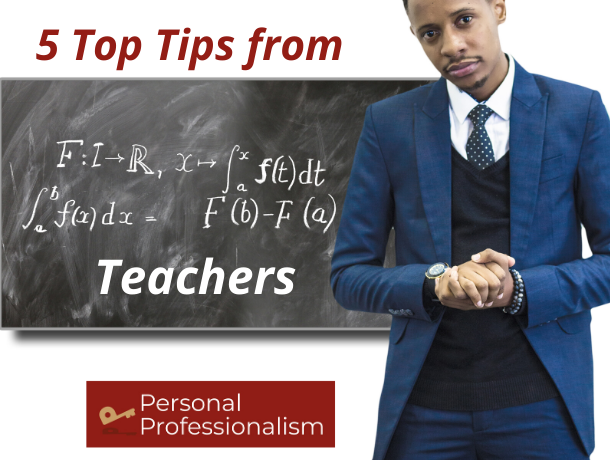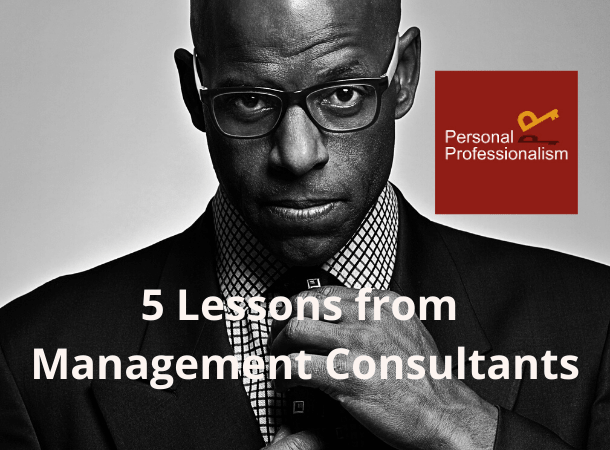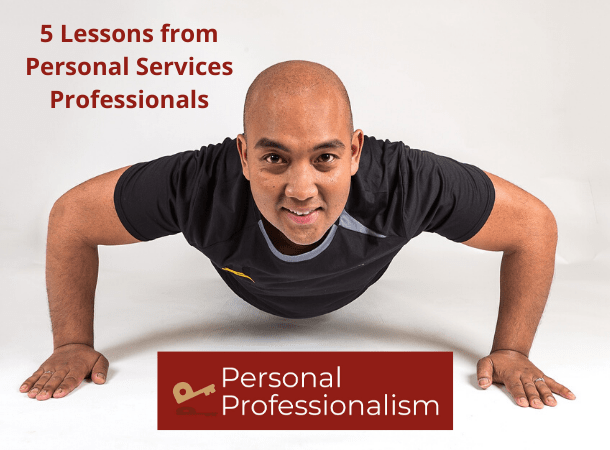5 top tips from teachers professionalism that you can apply today!

School teachers have a tough job.
Their work can set the paths of their students’ lives. Do a good job and they can inspire a person for a lifetime; do a poor job and, well, let’s just say it can have the opposite effect.
They are highly trained professionals who possess mastery over specialist subject areas (such as maths or geography or any range of subjects) AS WELL AS the skills of teaching. They need to be able to impart knowledge to mixed ability and sometimes unreceptive students while maintaining behavioural discipline; on top of all that, they need to deal with parents, peers and educational hierarchy.
Theirs is a job of balancing competing demands for teaching more than 30 children at a time yet treating each as an individual; addressing the individual needs of each student while complying with a state curriculum; fitting in with the ethos of their school; dealing with the demands of parents who don’t always see the whole picture. (I once heard a head teacher addressing an assembly of parents who often complain about what they’ve heard from their children. The head teacher said “if you promise not to believe everything you hear from your children about what is happening at school, we promise not to believe everything we hear from your children about what is happening at home!” Well, that shut them up!!)
Then there is the task of marking 20 to 35 (depending on class size) pieces of work, often multiple times per week. Each student’s work requires individual attention and consideration against set criteria – and not only set criteria but the struggle of understanding what each student is trying to say – or if they’re trying to say anything at all. There is the temptation to be swayed by the history of the student – to see the work of students with good records of achievement as being good, and vice versa with students with poorer records.
In fact, the problem for this ‘Lessons from other Professions’ article was stopping at only five lessons that we can learn from teachers!
The challenges to the personal professionalism of teachers include these five:
1. Who are these people?
When starting out as a teacher, it helps to develop your ‘teacher lens’ as to how you view those whom you teach. What you call them gives an insight as to how you will interact with them.
Do you see them as kids? Or children? In primary school especially, they are indeed children. The word ‘children’ seems rather formal in the ‘children should be seen and not heard’ sense.
Is that a suitable lens for a teacher? What if we call them ‘kids’ as we commonly and informally call children. ‘Kids’ are fun and naughty and silly and sensitive and love playing games; it’s what parents call their own kids.
The question is this: is this a suitable lens for a teacher?
What if we call them a customer, a client or a stakeholder? While these words may very well be true in certain settings, but this probably isn’t the best lens for a teacher to adopt.
‘Students’. That is probably the best word to use. By seeing these children, kids, customers, clients and stakeholders as students, it speaks to your purpose as a teacher.
This is a very simple insight into how the teacher sees him or her-self, their role, their purpose; the reason for their interaction with young people, the nature of the interaction and even extending to the formality of the relationship with the students, the expectations placed on the teacher and even the authority the teacher holds.
The lesson for other professions is this:
What do we call the people around us in our work-roles? More importantly, what is the self-talk behind what you call these people? Are the people you serve ‘customers’, ‘clients’ or even… ‘suckers’?
What you call them tells us a lot about your professionalism and your professional lens.
2. What do you expect?
This is a common question from trainee teachers about dealing with poor behaviour of young students and setting academic standards.
‘Harry’, whose job it is to train new teachers, responds to that question with another question: ‘what do you expect?’
This is a deceptively simple question. It is one that anyone in any work-role should ask themselves and continue to ask themselves throughout their careers.
For teachers, knowing what they expect is an active, explicit act. By being clear what they expect, they can express those expectations through their written and spoken word, through the way they conduct themselves in the classroom, how they interact with their students and how they respond when expectations are not met – both behavioural and academic.
If you want to see this in film, watch the 1960’s classic ‘To Sir With Love’, based on the book of the real-life experience of E.R. Braithwaite. The story, as told in the film, is how a teacher helps his teenage students become responsible individuals, away from the very low life expectations that the students otherwise had for themselves.
The teacher’s turning point was when he started treating the students as responsible, autonomous beings rather than as naughty children.
He set clear expectations of behaviour and conduct towards him and each other. It was reflected in how they were expected to address each other and how they should respond to both poor and good behaviour directed toward them.
Yes, this is a fictionalised account of a true story with a syrupy happy ending, but there is no doubt the technique of having clear expectations is effective. In my own experience, not in a teaching environment, I saw a turnaround in the professional behaviour of a team of uniformed workers when they were treated as responsible professionals rather than as children, which is how other managers had treated them.
Expectations based on how you see other people are incredibly powerful.
If you continue to treat people as fellow professionals even when they do not treat you as such means that you have maintained your standards and no one can have any genuine recourse against you, and ideally that others will come to realise that it is more effective to treat you with reciprocated professional respect.
There are various academic studies about teacher expectations that support the importance of teacher expectations but also HOW those expectations are expressed.
A study in New Zealand established that student academic performance was higher with teachers who had higher expectations of them (the details for Dr Li’s PhD is below). The implications were that teachers with higher expectations took more time to prepare appropriately for class and expressed their expectations very explicitly.
An important benefit of explicit and high expectations was that teachers were more attuned to the signs when performance fell short and were able to communicate specifically and genuinely with their students about what and how to improve.
Several studies from Indonesia assert that the way teachers dress can set expectations in classrooms (link to one of these articles below). Dressing formally influence a class culture to be more formal; informal dress influences the classroom to be informal.
Neither is better or worse, this is merely a statement of truth. Your form of dress influences culture and expectations.
The lesson for other professions is this:
The question for the teacher, and in fact anyone in any occupation, is to determine what expectations are most helpful in fulfilling the purpose of their work-role.
3. Managing the struggle between professional judgement of student need and parent/school wants
‘Cara’ tells me that teaching is a constant struggle between her own professional judgement about what is best for a particular child and what the school wants in terms of results, progress and scheme of work.
“It is a compromise”. Schools must work to government requirements which are in turn passed on to teachers and their students. “In reality, there is only so much that you can do”.
Cara has seen a different side. Teaching as a private tutor, outside of a school environment, Cara has been able to apply her professional judgement without the same pressures. She tells me that “where the parent agrees to let me do what I think best, the children have made the most progress as I am not having to compromise. For parents where they want the child to keep up with their peers at school, I continue to have discussions with them about what I feel their child needs and split sessions so that I am doing a mixture rather than just trying to get the kid to pass an exam”.
For example, Cara recently had a situation where the best outcome for the child was not to pass a particular exam, but to prepare for the change from primary to secondary education. Cara was able to advise the parents and then set about teaching her student accordingly with a pleasing result. This was in the child’s best interests, and not about passing an exam which would be the pressure in a school environment.
It highlighted where external expectations placed on teachers can unduly influence professional judgement in specific situations, but the true professional finds a way to serve the best interests of the child while performing to requirements.
The lesson for other professions is this:
Most jobs require being able to manage competing interests, from clients who want one thing to your employer who is only prepared to offer something else. Developing the ability to find a way through, to compromise, to prioritise and to do ‘the right thing’ (ethical, legal, quality) in the face of adverse pressure is professionalism applied!
4. Managing the conflict of delivering a relevant and purposeful learning experience and adherence to results-driven curriculum
A similar professional challenge to the point above is being able to manage the conflict that arises when a teacher is required to guide students to achieve results against curriculum requirements while trying to engage students in actual learning.
Passing exams can be mechanical and transactional – how often have any of us written what we know is the ‘right’ answer but not really understood why it is the right answer. This is often because the teaching has had to rely on students onboarding information through memorisation and rote learning, and not through true understanding.
Cara explains “I have often found that when kids understand what they are doing, then they actually find it more interesting”. Using her professional skills, she tries to achieve meeting curriculum requirements while engaging students by striking a balance and “provide interesting tasks”.
And therein lies the challenge. Teachers want to inculcate a love of lifelong learning and curiosity; they want students to come on an engaging journey of discovery. Curricula are important and have a solid reason for existence. But it is also true that any curriculum must be designed to serve the whole of a population and cannot take every student’s individual’s needs and abilities in to account.
The lesson for other professions is this:
What is that you need for your various stakeholders – do you want them simply to do what you want them to do, or do you want them to provide their professional judgement by possessing context and knowledge of your aims and requirements? This is especially important for managers and leaders trying to support a professional culture. Any manager can get any staff to do what they’re told, but you won’t get any real value from that; the staff member won’t learn or provide insight; and good staff will not stay around for long.
5. Not being trusted to deliver what you believe your class needs in a particular subject and being told exactly what and how to teach
Primary school teachers are responsible for the education of most precious little people on Earth. A great deal of trust is placed on them for helping students achieve academically; for learning what is socially acceptable and for pastoral care for their psychological well-being.
That is a lot of trust.
So when teachers are not trusted to teach and are told what and how to teach, it is a challenge. If they have a sense of their professional self, a teacher will understandably be frustrated when an instruction from authority conflicts with their judgement. They can feel undermined and unvalued.
Cara said that earning trust and breaking down distrust takes time and patience. Unless an instruction is completely against her judgement or ethics, she tells me that she will “do what I have to do but do something a bit different (through discussion with the leaders mostly) and then demonstrate afterwards that it was beneficial to the class. Then, from this point, it is possible to continue a discussion and have more trust develop”.
It takes time. Results are not immediate and the skilled teacher will be able to demonstrate that his or her judgement led to a better result than expected.
On the other hand, where an instruction or school ethos remains in conflict and is not going to change, Cara’s other option is “leave the school because nothing is going to change”.
The lesson for other professions is this:
Earning trust is rarely easy or immediate. It takes time and results. Better results ‘buy’ the professional social capital to continue to diverge from formal expectations and create something better.
It has been my experience that people feel that they should be trusted and respected from the moment they walk in the door of a new role. The outward signs of trust and respect might be present, but true trust takes a long time and clear communication with others to achieve.
The option to leave is always open should one’s professional identity and judgement be compromised by poor organisational ethos.
Some helpful references:
- The Effect of Teachers’ Dress on Students’ Attitude and Students’ Learning: Higher Education View, https://www.hindawi.com/journals/edri/2019/9010589/
- Li, Z. (2014). Teachers matter: Expectation effects in foreign language classrooms at university. (PhD), University of Auckland.
- Li, Z., & Rubie-Davies, C. (2014). Teacher expectation effects in the college foreign language classroom. In C. Rubie-Davies (Ed.), The social psychology of the classroom international handbook: Routledge.






